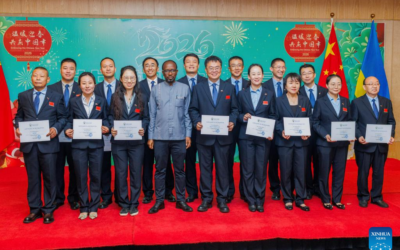By Staff writer
In a landmark move aimed at accelerating global progress toward sustainability, China has announced its partnership with the United Nations to establish a Global Center for Sustainable Development in Shanghai. The initiative marks a bold step in implementing the United Nations Agenda 2060, which seeks to build a more equitable, resilient, and environmentally sustainable world by mid-century. As the climate crisis, economic inequality, and global instability intensify, the need for such a center has never been more urgent.
The 21st century has been defined by complex and interrelated challenges—from the worsening impacts of climate change to the widening gaps in economic development. Despite ongoing efforts, many countries continue to struggle with implementing the 17 Sustainable Development Goals (SDGs), adopted as part of the UN Agenda 2030. As the international community now shifts its focus toward longer-term objectives under Agenda 2060, there is growing consensus that stronger global coordination, knowledge-sharing, and innovation are essential.
The Shanghai Global Center for Sustainable Development will serve as a knowledge and innovation hub, connecting governments, international organizations, academia, and the private sector. Its primary mission will be to coordinate best practices, facilitate South-South cooperation, and provide technical assistance to developing nations—especially those at risk of being left behind in the global sustainability transition.
Shanghai stands as a symbol of transformation and resilience. Over the past four decades, the city has evolved into one of the world’s leading financial, technological, and logistical centers. With its robust infrastructure, advanced research institutions, and strategic location within Asia, Shanghai is uniquely positioned to host a global platform dedicated to sustainable development.
Moreover, China’s experience in balancing rapid economic growth with environmental reforms makes it a critical player in shaping the global sustainability agenda. From large-scale reforestation projects to leading investments in renewable energy and green infrastructure, China offers a wealth of lessons that can benefit countries around the world.
China’s partnership with the United Nations on this center is a testament to its growing leadership role in global sustainability efforts. Agenda 2060 builds on previous frameworks such as Agenda 2030 but goes further in targeting long-term systemic change across four pillars: environmental integrity, economic resilience, social equity, and technological innovation.
China has already demonstrated its willingness to commit to this long-term vision. President Xi Jinping has emphasized the country’s dedication to achieving carbon neutrality by 2060, a goal that aligns closely with Agenda 2060’s targets. The new center will serve as a mechanism to operationalize these commitments, helping to translate vision into action both domestically and globally.
Furthermore, the initiative reflects China’s intention to deepen multilateralism and support the rules-based international order. By co-founding a major UN-affiliated institution, China is not only contributing financial and technical resources but also signaling its intent to be a responsible stakeholder in global governance.
One of the most compelling features of the Shanghai Center is its focus on inclusive innovation. Technological progress must be accessible and relevant to the needs of developing nations, many of which lack the infrastructure or capital to invest in cutting-edge solutions. The center will help bridge this gap by fostering technology transfer, capacity-building programs, and collaborative research.
Additionally, the center aims to advance gender equality, social protection, and youth empowerment—all key priorities under Agenda 2060. With a focus on inclusivity, the center will amplify voices often marginalized in global policy discussions, ensuring that no one is left behind.
The Global Center for Sustainable Development in Shanghai is more than just a physical institution—it is a blueprint for the future of global cooperation. As nations prepare to tackle the complex challenges of the coming decades, this initiative represents hope, leadership, and a shared commitment to building a better world.
By placing sustainability at the heart of its global engagement, China is not only shaping its own future but also paving the way for a more sustainable and united international community.








Your article helped me a lot, is there any more related content? Thanks! https://www.binance.com/en-IN/register?ref=A80YTPZ1
I don’t think the title of your article matches the content lol. Just kidding, mainly because I had some doubts after reading the article. https://accounts.binance.info/en-NG/register?ref=YY80CKRN
Hi, Neat post. There is an issue with your website in web explorer, could test thisK IE nonetheless is the market chief and a large element of other folks will leave out your wonderful writing because of this problem.
Only a smiling visitor here to share the love (:, btw great style.
You actually make it seem so easy with your presentation but I find this topic
to be actually something which I think I would never understand.
It seems too complex and extremely broad for me.
I’m looking forward for your next post, I will try to get the hang of it!
аромат Spirit of Kings Altair, https://spiritofkingaltair.ru/ – это красивое сочетание компонентов, которое очаровывает своим бурным характером.
Thankfulness to my father who stated to me on the topic of this blog, this web site is in fact amazing.